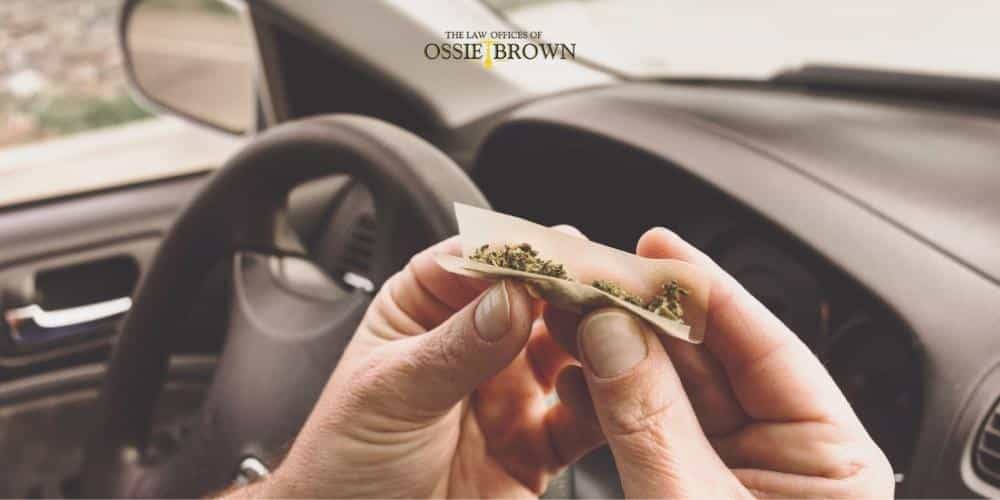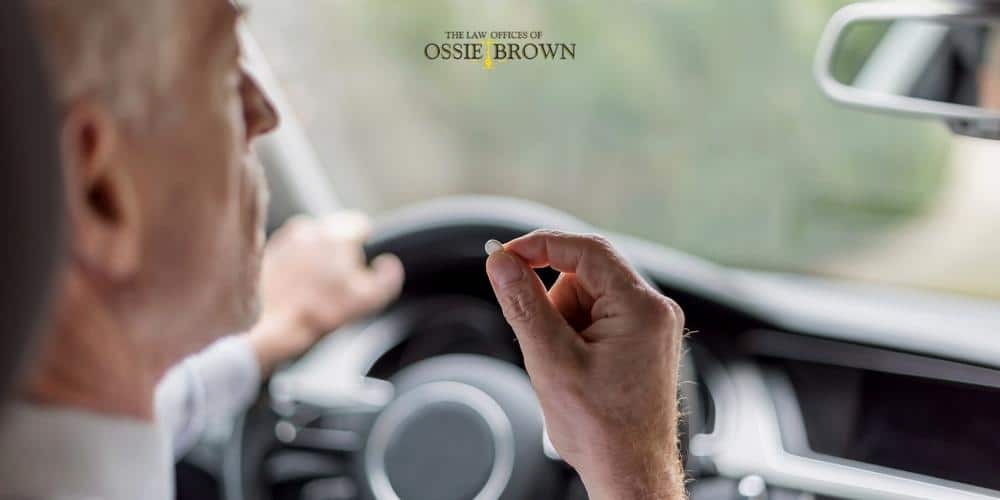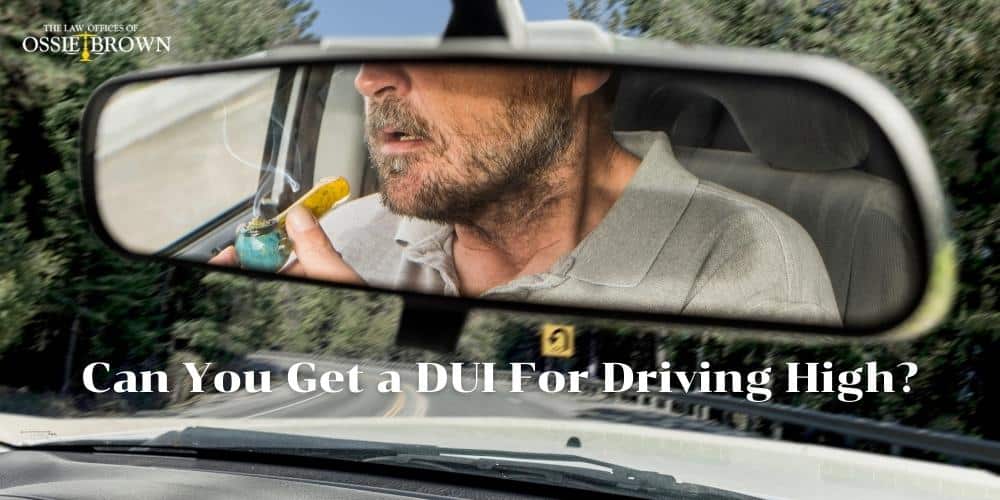We all know that you can get a DUI from driving drunk. But can you get a DUI for driving high? While specific DUI laws vary from state to state, under Louisiana DWI laws, the answer is yes. But how do DUI marijuana cases work?
If you commit some kind of traffic violation while driving drunk, for example, you may get pulled over and asked to submit to a breathalyzer and/or blood test. If your blood test shows that your BAC is higher than the legal limit (0.08%), you may get convicted of a DUI. Some states follow the same per se laws for marijuana metabolites. If the THC concentration in your blood is above a specific number, then you can get a marijuana DUI. Other states, like Louisiana, issue marijuana DUIs based on impairment level. Our legal team explains all this and more below.
Recreational use of marijuana or other drugs can result in major consequences, especially when you get behind the wheel. If you were caught and convicted of driving under the influence of marijuana or another substance, you need legal help from a Baton Rouge DUI lawyer at The Law Offices of Ossie Brown. Call us today at 225-343-1111 to schedule a free consultation.
What Does DUI Mean?
DUI means “driving under the influence.” Similarly, DWI means “driving while intoxicated.” When most people hear the acronyms DUI or DWI, they immediately think of driving under the influence of alcohol. But in most states, including Louisiana, the DUI law applies to marijuana and other drugs as well.
According to Louisiana law (R.S. 14:98), a driver is operating a vehicle while intoxicated if they:
- Are under the influence of alcoholic beverages
- Have a blood alcohol content (BAC) at or above the legal limit of 0.08%
- Are under the influence of any controlled substances listed in Schedules I through V
- Are under the influence of both alcohol and legally obtainable drugs (whether they have a prescription for the drugs or not)
So the answer to the question – can you get a DUI for driving high – is yes. Driving under the influence of marijuana is illegal in Louisiana. Any kind of impaired driving can result in a DUI charge and/or conviction.
How Does Cannabis Affect The Brain and Body While Driving?
Similarly to alcohol use, Marijuana use can greatly impair the mind and body, especially while behind the wheel. According to the CDC, consuming cannabis can distort perception, decrease reaction time, distort vision, impair coordination, and make it difficult to make decisions. All of this can greatly affect a person’s driving ability. High drivers can certainly cause a crash resulting in bodily harm and/or death.

Driving Under the Influence of Marijuana
Similar to alcohol DUI laws, marijuana DUI laws can vary state to state. Most states categorize driving under the influence of marijuana either as “impairment” or “per se THC laws.”
Marijuana Impairment
Impairment, or being “under the influence,” generally means that someone can’t drive safely due to alcohol or marijuana use or that a driver’s blood alcohol content exceeds the legal limit. So state laws like this mandate that a driver can receive a DUI charge if they are impaired by either alcohol or drug use. A driver can also receive a DUI charge if a blood test shows that they have a BAC of 0.08% or higher.
In order to receive a DUI charge for driving under the influence of marijuana, a jury must prove that the marijuana actually impaired them in some capacity. The jury doesn’t have to prove that there was a certain amount of THC in the driver’s system. Louisiana abides by this rule for marijuana DUIs.
An arresting officer may look for physical symptoms such as slurred speech, unusual behavior, slow reflexes, and red/bloodshot eyes in order to determine overall impairment. All of that on top of bad driving can warrant a marijuana DUI.
Per Se THC and Marijuana Metabolite DUI Laws
Per se laws generally refer to a DUI conviction solely due to BAC levels. Per se laws can also refer to THC concentration in someone’s blood. Some state laws specifically list a specific limit of THC or marijuana metabolite (which are leftover compounds when the body metabolizes the substance). Meanwhile, other marijuana DUI laws mandate that someone can get a DUI just from having any measurable amount of THC in his or her system.
There is a problem with per se marijuana DUI laws. Marijuana metabolites can remain in the bloodstream for several days or weeks after the last time someone smoked or consumed THC. More specifically, the American Addiction Centers states that THC can be detected for up to:
- 90 days in hair,
- 1 day to 1 month in urine,
- 24 hours in saliva,
- And 12 hours in blood.
So if someone is pulled over and tested for driving under the influence of marijuana, they could get convicted of a DUI for having any amount of THC concentration in his or her system, even if they last smoked the day prior.
Can You Get a DUI For Driving High on Medical Marijuana?
Medical marijuana is now legal in Louisiana, but that doesn’t mean that users can drive while high. You can still definitely get convicted of a marijuana DUI whether you’re high on delta 8, medical marijuana, or any other substance.
Can You Get a DUI For Driving High on Delta 8?
Recreational marijuana as a whole is still illegal in Louisiana. But is Delta 8 legal in Louisiana?
Delta 8 THC is now legal statewide – with exceptions, of course.
Just like medical marijuana, you can definitely get a marijuana DUI if you drive while high on Delta 8. Delta 8 THC tends to be much more mild than delta 9 THC, but still, it can cause a high. Driving while high on any type of substance is never a good idea. You could crash and take your life or someone else’s.
Drugged Driving Penalties in Louisiana
Driving under the influence of marijuana, alcohol, or some other controlled substance can result in a serious charge. Generally, people who commit this criminal offense will face the same penalties as they would for an alcohol DUI.
- First Offense: The first offense of driving under the influence of marijuana is a misdemeanor. Offenders can face 10 days to 6 months of jail time, up to 2 years of probation, a fine of up to $1,000, mandated community service hours, and mandated participation in a substance abuse program.
- Second Offense: A second marijuana DUI is also a misdemeanor. Offenders can face 30 days to 6 months of jail time, up to 6 months probation (or 48 hours in jail), a fine of up to $1,000, mandated community service hours, and mandated participation in a substance abuse program.
- Third Offense: A third marijuana DUI is a felony. Offenders can face up to 5 years in jail, a maximum fine of $2,000, mandated community service hours, up to 5 years of probation, mandated substance abuse evaluation/treatment, and possible vehicle seizure.
- Fourth and Subsequent Offenses: A fourth offense (and all other subsequent offenses) of driving under the influence of marijuana is also a felony. Offenders can face 10 to 30 years behind bars, a fine of up to $5,000 up to 5 years of probation, vehicle seizure, at least 1 year of home incarceration, mandated substance abuse evaluation/treatment, and mandated community service hours.
If a high driver crashes, injures, and/or kills someone, they may face enhanced penalties. These enhanced penalties may include a longer jail sentence, a higher fine, and/or a revoked driver’s license. A repeat offender of alcohol or marijuana DUIs can struggle to obtain employment, may have an ignition interlock device in their car (a breath test), and have outrageous insurance premiums. It’s always best to drive sober and responsibly.

Call a Baton Rouge DUI Lawyer at The Law Offices of Ossie Brown Today
If you’re facing a DUI conviction for alcohol or marijuana use, you need to pursue legal help from The Law Offices of Ossie Brown. We have what it takes to take on DUI marijuana cases. We could possibly help you achieve lesser penalties or get rid of the DUI charges altogether. At the very least, we will stand by your side and defend your legal rights. Call 225-343-1111 to schedule a free consultation with a Baton Rouge DUI lawyer at our law firm today.
The criminal team at the Law Offices of Ossie Brown also has what it takes to take on general traffic violation cases, aggravated assault cases, domestic violence cases, theft crime cases, and so much more.

